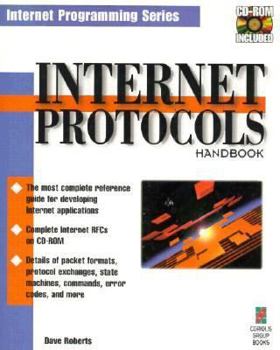Internet Protocols Handbook, with CD-ROM
This reference contains a list of the major Internet protocols, including those for data links, mail, network news, transport, file transfer, remote terminals, distributed computing, security,... This description may be from another edition of this product.
Format:Paperback
Language:English
ISBN:1883577888
ISBN13:9781883577889
Release Date:August 1996
Publisher:Coriolis Group Books
Length:448 Pages
Weight:1.85 lbs.
Dimensions:1.2" x 7.4" x 9.2"
Customer Reviews
3 ratings
If you can find it, buy it!
Published by Thriftbooks.com User , 25 years ago
It's too bad that this book is no longer published. While it's a bit dated, it's still the only reference available in book form and is *much* easier to read than the actual RFC's themselves. It would be great if the author/publisher updated this book, or another publisher did a similar project. I have found the book to be invaluable.
Excellent reference
Published by Thriftbooks.com User , 26 years ago
This book contains extensive information about, appropriately enough, Internet Protocols.I think it could have been made a little better if the author explained a little bit more about how each protocol works - for instance, in the definition of the IRC protocol, all the protocol commands are listed, but things like how to use those commands - which ones come before others, etc. is left up to the RFC, which can be lengthy and hard to follow.Still, overall a great reference.
A valuable reference for Internet protocols.
Published by Thriftbooks.com User , 27 years ago
The back cover of this book claims, "The Internet Protocols Handbook is a perfect solution for programmers and who need to look up information quickly and efficiently. It's designed to answer the needs of network protocol implementors, hardware designers, application programmers, system administrators, project leaders, students, and instructors." Leave out"perfect" and it is an accurate description; that's not to say there is any serious impediment or imperfection - I am just leery of words like 'perfect' and 'absolute.' The author maintains a Web site where the latest information is available with any additions or corrections. He also invites bug reports and suggestions for material that might have been included. The book brings together some thirty protocols and related subjects, each dealt with in a common format: Name of the protocol/format, Abbreviation, Status, Specifications, Abstract, Related specifications, See also, Comments, Description, Transport information, Commands, Responses, Protocol state machine, Grammar, and Frame, packet, or message formats. The first six items don't take up much space. Apart from the abstract (five or six lines) they contain references to standards and RFCs. A companion CD contains some 1300 RFCs, and is indexed in such a way as to make location of any particular document quite simple. It is an excellent example of how CD media can be put to efficient use, saving space (and a lot of trees) without any inconvenience to users. The abstracts are a very useful way of identifying the purpose of protocols, especially for those who know what they want to do but are not sure which protocol is appropriate. In some cases there is more information than one is likely to find elsewhere in a single source. For example, a remarkably large number of MIME types are registered and they are all listed here with many ftp sites cited for further information. Under MIB-II all the formal object definitions are recorded, and there is quite extensive data relating to SNMP. Protocols covered are: Address resolution (ARP), Bootstrap (BOTP), Daytime (enables retrieval of current date/time from server), Dynamic host configuration (DHCP), File transfer (FTP), Hypertext transfer (HTTP), Internet control message (ICMP), Internet group management (IGMP), Internet message access (IMAP4), Internet protocol on ethernet networks (IP-E), Internet protocol (IP), Internet relay chat (IRC), Network news transfer (NNTP), Post office (POP3), Simple mail transfer (SMTP), Simple network management (SNMPv2), TELNET, Transmission control (TCP), Trivial file transfer (TFTP), and User datagram (UDP). Non-protocol items include: Computing the Internet checksum, Domain name system, Format of e-mail messages, HTML (as distinct from HTTP), MIB-II, MIME (and registered MIME types), SMTP service extensions, USENET article format, and Well-known ports. The inform






